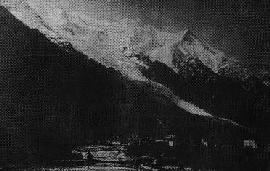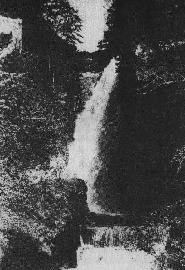When the ship on which my Uncle Christian crossed the sea in the late 1840's was becalmed in midocean, Uncle went over the side to cool himself in the Atlantic. But no sooner had he risen to the surface after his dive, than loud cries of "Shark!" from the sailors warned him to swim to the ship, where he seized the bottom rung of the rope ladder just as the lunging shark was upon him. And while he clung to the rope, the sailors frantically hauled him out of the reach of the monster fish.
I was a very small girl when the letter telling of Uncle Christian's escape from the shark arrived. How exciting it was! But Uncle's letters were like that. My brothers and I came to regard him as my grandchildren today regard Lindbergh. Whenever a letter came from Uncle Christian, I would run to hear it, even if I had to stop reading Wilhelm Tell at the very point where he was about to shoot the apple from his son's head
Upon reaching America, Uncle took employment as a cabinet maker at Sainte Genevieve, Missouri. He was there when the cholera epidemic decimated the population, and he and his employer were busy until late every night making coffins for the dead. Then his employer was seized by the pestilence, dying three hours later; and Uncle had to make a coffin for him. Just as Uncle was driving the last nail in his employer's casket, he too was stricken with the paroxysms; but since it was not his time to die, he recovered. Some time later he married a Sainte Genevieve girl, with whom he moved to St. Joseph, Missouri. There he opened a wagon shop while his bride, Aunt Christine, kept boarders. By their combined efforts they made money rapidly. In a single year they cleared more than three hundred dollars above all expenses. This was almost too fabulous for credence, yet we believed it, for did it not say so in Uncle's own handwriting? Then came the passage of the Kansas-Nebraska Bill, bringing profits to Uncle Christian from homeseekers bound for the new territories. Uncle could not go to the new country without leaving his lucrative business in St. Joseph, but he remarked to Aunt Christine:
"What a wonder opportunity to own a farm is this for my poor brother Benjamin!"
Poor Brother Benjamin was my father, Benjamin Dubach, a tenant of a dairy farm on the southern slope of Montagne d'Orvin in Switzerland, where he lived with his wife, Jeanette, and their children: Fred, who was eight; Adolph, who was ten; and myself, who was twelve.
But we did not consider Father as poor. In fact, we thought he was rather well to do.
My father owned two goats and five cows to provide milk for our dairy, enough sheep to furnish us with woolen garments for winter, a field of flax to yield sufficient for linen-wear for summer, and the hand tools for cultivation of his farm. He had no work animals and needed none, for his arms and back were strong. My mother had a loom, on which she converted flax into linen shirts or dresses, wool into cloaks or stockings, or even cocoons into silk finery for Sunday.
The place where we lived was of such rare beauty that British and Americans go there today to ski in winter and to admire the scenery in summer. Below us wound the lovely valley of the Aare, beyond which towered the Alps, ever beautiful, whether veiled in clouds or ashimmer with the iridescent reflections of sunlight on the snow. Dominating the other Alps stood the Jungfrau, where dwelt the Lorelei, and the Matterhorn, along whose escarpments leaped the chamois.
 Click here for a larger image
Click here for a larger image
We were rich, too, in education. We had more books than any of our friends, and we knew two languages. I not only could speak German and French with equal facility, but could read both languages readily, besides speaking the Swiss patois. My father and mother used French in conversation with each other; but to make certain that we children should be bilingual, Father addressed us in German and Mother in French; and we replied in like manner. Before I started to public school my father's mother took me on her lap and taught me to read German out of the Kinder-Bibel. When I had read it through she presented me with the Book. After I was eight Grandmother died; and then I walked three miles to the village of Orvin in the valley to attend public school which was conducted in French. I also read the Reformed Church catechism in French, and, as a reward, was given a French child's Bible by my pastor. My mother gave me a French testament and my father bought me a psalm book, all of which composed a rich Biblical library for a girl of twelve.
Besides my school training I had a practical home education. My mother taught me how to keep house and to sew. Long before I was twelve I had worked a linen sampler.
I was blessed, too, in my family. My father could startle every echo on Montagne d'Orvin with his yodeling. He was an expert wrestler, a broad jumper, and so skilled at fly casting that no one else could bring home finer messes of speckled trout than he. And he was a hero, having saved two persons from drowning, one from the unruly waters below the cataract at Taubenloch. He was consistently kind to his children, patient with everyone, open-handed with the poor, and a good provider. He worked with joy in his fields and thought nothing of journeying afoot to deliver butter to his customers in the village. Butter was his cash crop; he grew barley and cut hay merely to feed the animals that gave the milk for butter.
 Click here for a larger image
Click here for a larger image
People called Mother a handsome woman. She was erect and slender; she had rosy cheeks, abundant black hair and sparking grey eyes in contrast to Father whose eyes and hair were brown. She was French born, but had come to Switzerland to live at Courrendlin, where her father was maitre of an iron foundry. My father was a workman there and married the boss's daughter.
With my brothers I had a gay life on the mountains, picking flowers in summer, coasting in winter, and watching the processions of cattle with garlands round their necks march past our house from the village in the valley to the highland pastures in May.
But despite our wealth Uncle Christian thought of us as poor. Following the opening of Kansas and Nebraska for settlement, he wrote Father a letter which was to change our entire life; but since it took from two to three months for a letter to journey by steamboat, sail-ship, railroad, and stage from St. Joseph to Orvin, we continued to live in affluence on our mountain, while the letter with news of our poverty slowly drew nearer and nearer.